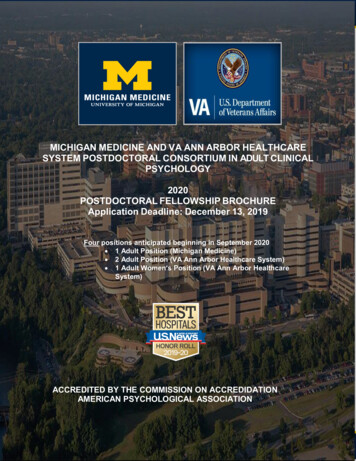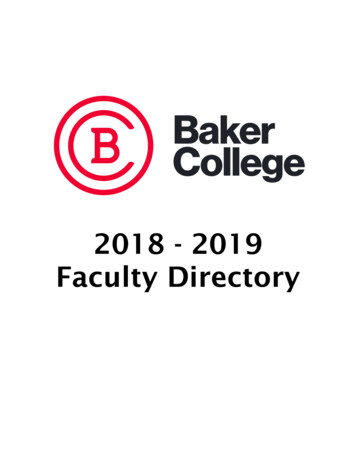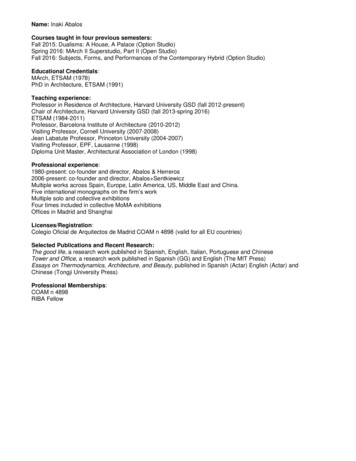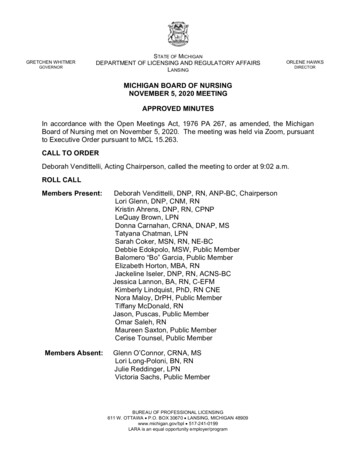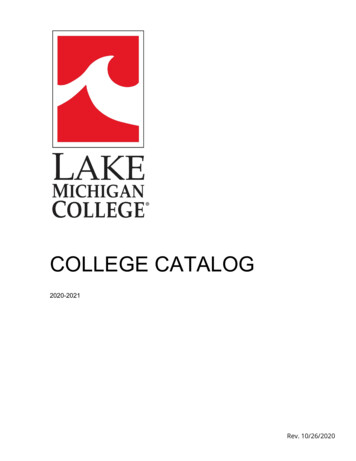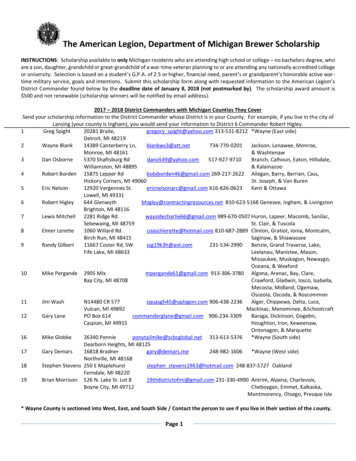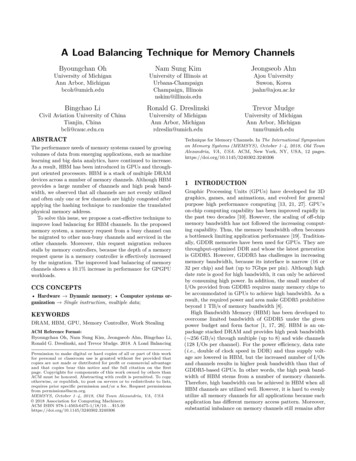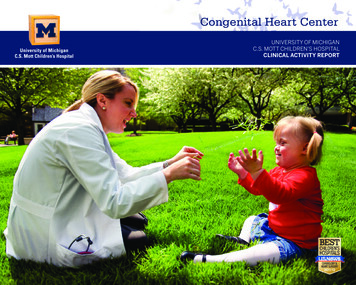
Transcription
Congenital Heart CenterUNIVERSITY OF MICHIGANC.S. MOTT CHILDREN’S HOSPITALCLINICAL ACTIVITY REPORT
TO MAKE A REFERRAL ORSPEAK WITH ONE OF OUR SPECIALISTS,CONTACT M-LINE 24 HOURS A DAY,7 DAYS A WEEK.RICHARD G. OHYE, MD, HEAD, SECTION OF PEDIATRIC CARDIOVASCULAR SURGERYJOHN R. CHARPIE, MD, PHD, DIRECTOR, DIVISION OF PEDIATRIC ongenitalEXTRAORDINARY HEART CARE FOR CHILDREN AROUND THE NATION AND ACROSSTHE GLOBELeaders in cardiac care, discovery and educationAs an international referral center for children with complex congenital heart disease, theUniversity of Michigan Congenital Heart Center at C.S. Mott Children’s Hospital is one of thelargest and best congenital heart programs in the United States. From diagnosis and medicalCanada2Switzerland2management of the most common cardiac disorders to application of the most complexU.K. 1Dominica 6DominicanRepublic 243 States13,380and innovative therapies available, our pediatric specialists are committed to providing theMongolia2FormerYugoslavia1most advanced, evidence-based care for infants, children and adolescents with all forms ofChina3India1El Salvador 2Honduras 9Panama 2Bolivia 1Chile 10Guyana 1congenital and acquired heart disease, as well as for adults with congenital heart disease.Philippines8Vietnam1INDEX: 4 Cardiology 10 Cardiac Surgery 14 Patient Care 16 Innovation and Research
Discover the Michigan Difference46Adult18 yrs 210Experience mattersResearch shows that clinical volume and experience are key determinants of quality of care. The breadthand depth of our program results in a unique level of experience across the spectrum of congenital heartconditions—from fetus to adult—as well as expertise in the full range of treatments and therapies. Our goalis to consistently offer you and your patients access to the latest emerging technologies and therapiesthrough clinical trials and cutting-edge research.Important discoveries and bold new approaches to careAs one of the nation’s best funded pediatric research programs, our physicians are known for theirrelentless pursuit of innovation and quality improvement. From our work in the 1970s to developExtracorporeal Membrane Oxygenation (ECMO) to our more recent work to redefine approaches to treatHypoplastic Left Heart Syndrome, our driving focus is to continue to improve the procedures, processesand equipment that change the lives of congenital heart patients around the world.STRENGTH IN NUMBERSON MARCH 27, 2012, DR. EDWARDBOVE PERFORMED HIS 10,000THCARDIAC PROCEDURE AT THEUNIVERSITY OF MICHIGAN.Focused on kids being kidsC.S. Mott Children’s Hospital was the first pediatric hospital in the country to create a Child Life programto preserve the ability of children to “just be kids,” even when they are sick. Our internationally recognizedteam of pediatric-specific cardiac surgeons, cardiologists, cardiac nurses, anesthesiologists and alliedhealth professionals specializes in caring for this unique group of patients.We strive always to deliver highly competent, skilled and knowledgeable health care services guided by respectfor children and families. Our work is characterized by our commitment to focus beyond survival to offerpatients the best chance at a robust quality of life, improved long-term outcomes and reduced morbidity.2 M-LINE: 800.962.3555 www.mottchildren.org/congenitalNeonatesless than30 days7962011 Referrals274266Child1 – 18 yrsInfant1 mo – 1 yrC.S. MOTT CHILDREN’S HOSPITAL WAS THE 1st PEDIATRIC HOSPITAL IN THE COUNTRY TO CREATE A CHILD LIFE PROGRAMTO PRESERVE THE ABILITY OF CHILDREN TO “JUST BE KIDS,” EVEN WHEN THEY ARE SICK
Pediatric CardiologyThe University of Michigan is home to the Midwest’s largest team of pediatric cardiologists. Our state-ofthe-art diagnostic and interventional suites in the new 12-story C.S. Mott Children’s Hospital are staffed bya dedicated team of experienced pediatric cardiologists, technologists, anesthesiologists and allied healthcare professionals. Working seamlessly with our colleagues in pediatric cardiac surgery, we are committedto unparalleled care for our patients and a close collaboration with our referring physician partners.232ElectrophysiologyU-M’s team of pediatric electrophysiologists performs implantation of pacemakers or implantabledefibrillators for those with life-threatening conditions. We utilize the latest mapping and roboticnavigation tools for heart rhythm treatments, such as catheter ablation. All of these procedures areperformed in our new, dedicated pediatric EP lab. In addition, our heart rhythm specialists provide thefull range of diagnostic non-invasive tests such as stress electrocardiography, home rhythm monitoringand remote pacemaker support.2008Fetal Heart ProgramIn collaboration with the Fetal Diagnosis and Treatment Center, our multidisciplinary fetal heartspecialists provide the full spectrum of fetal diagnostic, interventional and delivery planning servicesfor mothers and families with babies diagnosed in-utero with congenital heart defects. Each memberof our team is committed to optimizing long-term outcomes and helping infants develop into healthy,productive adults.ELECTROPHYSIOLOGY VOLUMES3123053271832007200920102011Volume data include ablations with electrophysiology studies,pacemakers, implanted cardioverter-defibrillators (ICDs),cardioversion and other electrophysiology procedures.Our specialized interventional services include catheter-based fetal cardiac interventions for a smallsubset of babies who are candidates, including those with critical aortic stenosis, as well as HypoplasticLeft Heart Syndrome complicated by a restrictive atrial defect.A distinctive feature of our fetal heart program is our seamless integration with U-M’s Von VoigtlanderWomen’s Hospital and its team of maternal-fetal medicine specialists, with our fetal cardiology program,private-room birth center, newborn intensive care unit (NICU) and pediatric cardiothoracic intensivecare unit all co-located in one state-of-the-art building. This unique arrangement optimizes maternaland fetal well-being and ensures a smooth transition of care for the infant after birth.We work closely with referring physicians to co-manage the pregnancy and to continue routine careclose to home as much as possible.4 M-LINE: 800.962.3555 www.mottchildren.org/congenitalIN 2011, OUR ELECTROPHYSIOLOGY ABLATION VOLUMES INCREASED 20% WITHNO COMPLICATIONS10Electrophysiology study(no ablation)46Other (lead procedure,temporary lead,other invasive EPlab procedure)44Direct current orother cardioversion292011EP Volume byMajor ProcedureTypeImplanted cardioverterdefibrillator (ICD)39Pacemaker159Ablation withelectrophysiologystudy
Pediatric CardiologyCARDIAC ECHO VOLUME BY PROCEDURE TYPEInterventional CardiologyUniversity of Michigan pediatric cardiologists offer the full range of catheter-based technologies toenable the least invasive, most effective diagnostic and treatment approaches for a variety of heartlesions. Our team of experienced cardiologists and pediatric-specific clinical staff utilizes the latesttechnologies to provide unparalleled interventional care.Adult Congenital Heart ProgramThe University of Michigan treats the largest number of adult patients with congenital heart disease inthe state, with extensive experience in adult congenital cardiac imaging, high-risk obstetrics, pulmonaryhypertension, cardiomyopathy and heart failure management. Our adult congenital specialists are doubleboarded in both Pediatrics and Internal Medicine for transition of care from adolescence to adulthood.752FetalEcho638490556TransesophagealEcho (TEE)2007Non-Invasive ImagingOur dedicated pediatric cardiac diagnostic services utilize advanced imaging to facilitate interventionaland surgical care. Procedures are coordinated whenever possible to allow for convenient, same-daytesting. We offer the latest in non-invasive imaging techniques including 3D echocardiography, fetalechocardiography, intracardiac and intravascular ultrasound and on-site cardiovascular MRI. All testsare interpreted by dedicated pediatric cardiologists with advanced training in non-invasive imaging.20IntracardiacEcho (ICE)ADULT CONGENITAL HEART VISITS2008200920107856TransthoracicEcho2011AS A REGIONAL REFERRAL CENTER, IN 2011 OUR PEDIATRIC CARDIOLOGISTS INTERPRETEDRESULTS ON MORE THAN 720 ECHO’S FROM PARTNER HOSPITALS THROUGHOUT MICHIGANCARDIOVASCULAR MRI VOLUMES374Our designation as an ICAEL-certified echocardiography laboratory attests to the quality of our imagingprogram, characterized by collaborative reading of studies by multiple pediatric cardiologists andconsistent internal quality auditing.Transcatheter Pulmonary Valve TherapyTranscatheter pulmonary valve implantation is a novel, cutting-edge,minimally-invasive heart valve therapy for failing right ventricularto-pulmonary artery conduits that uses a catheter-based approachrather than traditional open-heart surgery.2322008200920102011CARDIAC CATHETERIZATION VOLUMES152320657701685200920102011C.S. Mott Children’s Hospital is one of only ten U.S. centers included inthe Medtronic Melody Transcatheter Pulmonary Valve Post-ApprovalStudy. We were the first center to implant a valve in the study and thefirst to complete enrollment. Today, C.S. Mott Children’s Hospital is oneof the highest-volume implanting centers in the U.S., having implanted43 valves as of April 2012. (The Melody Transcatheter Pulmonary Valve iscurrently approved for humanitarian use.)6 M-LINE: 800.962.3555 www.mottchildren.org/congenitalIN 2011: 21 IMPLANTS 100% PROCEDURAL SUCCESS 0 PROCEDURAL DEATHS 0 RE-INTERVENTIONSdenotes major complications
2011QUICKFACTSTransesophageal EchoAdultCongenital Heart(TEE)Visits556638Intracardiac Echo(ICE)20720Cardiac ECMO22Patient and FamilySatisfactionTransthoracic Echo96.97856%ECHO results interpretedfrom partner hospitalsthroughout MichiganElectrophysiologyCardiovascular MRIsVolume374327Fetal Echo752ELECTROPHYSIOLOGICABLATIONVOLUMES INCREASED20%with NO COMPLICATIONSCardiac SurgeryTotal Volume801Cardiac Catheterization685
SINCE OUR PEDIATRIC CARDIACSURGERY PROGRAM BEGAN, WEHAVE CARED FOR MORE THANPediatric Cardiac SurgeryPATIENTSCARDIAC SURGERY LESION SPECIFIC VOLUME AND OPERATIVE SURVIVALSince our pediatric cardiac surgery programbegan, we have cared for more than 20,000patients, making us one of the largest, mostexperienced programs in the United States.The pediatric cardiac surgeons at C.S. MottChildren’s Hospital have earned internationalrenown for their expertise in treating even themost complex congenital heart defects. Ourprogram has become an international referralcenter for conditions such as Hypoplastic LeftHeart Syndrome and other single ventriclelesions, high-risk biventricular repair, complexforms of Transposition of the Great Arteries andmany other congenital abnormalities.In 2011, our new 1.1-million-square-foot children’shospital opened, including three state-of-the-artdedicated pediatric cardiovascular operatingrooms staffed by sub-specialty trained pediatriccardiac anesthesiologists and a dedicatedpediatric cardiovascular OR team.200820092010CARDIAC SURGERY TOTAL VOLUMES2011922 8998599278012007200920102011Arterial Switch8 cases29 cases32 cases12 cases27 cases34 cases10 cases38 cases34 cases10 cases28 casesTetralogy ofFallot Repair27 casesSingle Ventricle–Stage I2008IN 2011, OUR NEW 1.1 MILLION SQUARE FOOT CHILDREN’S HOSPITAL OPENED,INCLUDING THREE DEDICATED PEDIATRIC CARDIOVASCULAR OPERATING ROOMS2011 SURGICAL PROCEDURE COMPLEXITY98%41 casesCategorized by STS-EACTS type,Category 5 being the most complex case type37 cases35 cases39 casesSingle Ventricle–Stage IICategory 1Category 242 cases38 cases45 cases33 casesSingle Ventricle–Stage IIICategory 3Category 4Category 510 M-LINE: 800.962.3555 www.mottchildren.org/congenital050100150200
2011 CARDIAC ECMO VOLUME ANDSURVIVAL TO HOSPITAL DISCHARGEPediatric Cardiac Surgery22 casesTRANSPLANT VOLUMESHybrid CapabilitiesPediatric cardiac surgeons and interventional cardiologists at C.S. Mott Children’s Hospital collaborateto offer selected patients with Hypoplastic Left Heart Syndrome the option of a hybrid approach,combining catheter-based technology and surgery. This approach is generally reserved for patientsidentified as high risk for the Norwood procedure, such as preterm infants, as our outcomes fortraditional staged surgical repair in standard-risk patients continues to compare favorably to thosepublished for the hybrid procedure. Since 2009, we have performed 12 hybrid procedures with 100%procedural success and 83% survival-to-discharge in this very high risk population.20072008Transplant and Heart FailureU-M pediatric cardiac surgeons have performed more than 200 pediatric heart transplants since thetransplant program’s beginning in 1984, consistently reporting low organ rejection rates and patientsurvival rates that rank among the world’s best. Our dedicated, multidisciplinary team of pediatriccardiac transplant surgeons, transplant cardiologists, pharmacists, nutritionists and social workersprovides coordinated and comprehensive evaluation, treatment and follow-up management, includinga full spectrum of support services to children and their families. We participate in multiple transplantlistings and have extensive experience performing combination transplants such as heart/kidney orheart/liver. In addition, our innovative research endeavors give patients access to the newest treatmentsavailable, including the full range of ventricular assist devices (VADs).200920102011adult patientswith congenitalheart diseasepediatricpatientPediatric Cardiac ECMO ProgramAs the center where Extracorporeal Membrane Oxygenation was first developed, the University ofMichigan has the most ECMO experience in the world. Since 1985, U-M has cared for more than2,000 patients on ECMO. Today, C.S. Mott Children’s Hospital is still the national leader in applicationand successful utilization of ECMO on congenital heart patients.12 M-LINE: 800.962.3555 www.mottchildren.org/congenitalSINCE 2009:12 HYBRID PROCEDURES 100% PROCEDURAL SUCCESS Compared to 48%Extracorporeal LifeSupport Organization(ELSO) internationalaverage.83% SURVIVAL TO DISCHARGE
PEDIATRIC CARDIOTHORACIC INTENSIVE CAREUNIT PATIENT AND FAMILY SATISFACTION95.5%Patient CarePCTU CATHETER-ASSOCIATEDBLOODSTREAM INFECTIONS96.9%The CDC pooled mean for BSI is 2.1 BSIs/1000 line days95.0%2008200920103.92011National Benchmark1.6200720082009201020111133COMPLETED PATIENT TRANSPORTSIN 2011, NOT INCLUDINGORGAN PROCUREMENTOur Pediatric Cardiothoracic Intensive Care Unit (PCTU) and general cardiac care unit have a specializedstaff of dedicated cardiac physicians, nurse practitioners, nurses, respiratory therapists, pharmacists,nutritionists, social workers, child life specialists and other support staff to deliver the optimal experiencefor children and their families. We strive to provide patient- and family-centered care, and are among thefirst academic medical centers to institute multidisciplinary family-centered rounds and involve familiesin all medical decisions. Families also serve on our Congenital Heart Center leadership committees.Our continued commitment to quality improvement is demonstrated through our involvementand leadership in many national quality collaboratives such as the Children’s Hospital Association(formerly known as NACHRI), Society of Thoracic Surgeons (STS), Extracorporeal Life SupportOrganization (ELSO), Pediatric Heart Transplant Study and the National Pediatric Cardiology QualityImprovement Collaborative.14 M-LINE: 800.962.3555 www.mottchildren.org/congenital1 OF ONLY 2THE UNIVERSITY OF MICHIGAN ISCENTERS IN THE U.S. WITH THE CAPABILITY TO PROVIDE MEDICAL TRANSPORT SERVICES FOR PATIENTS ON ECMO.OUTPATIENT CLINIC VISIT VOLUMESSURVIVAL FLIGHTThe University of Michigan’s Survival Flightair and ambulance service is able to handleemergent cases at any time. Our fleet isequipped to transport patients from all Michigancounties and can fly anywhere in the UnitedStates. Our dedicated staff is trained andequipped to transport patients on intra-aorticballoon pumps, heart assist devices and ECMO,and we maintain a dedicated helicopter fororgan 11
Innovation ResearchThe University of Michigan currently ranks 7th inNIH funding among all medical school pediatricdepartments across the nation. As a majorcontributor towards understanding the basicmechanisms involved in congenital heart diseaseand translation of research findings to patientcare, the University of Michigan CongenitalHeart Center has a dedicated, multidisciplinaryresearch arm. M-CHORD, Michigan CongenitalHeart Outcomes Research and Discovery,facilitates collaboration among investigators withan interest in and expertise related to congenitalheart disease from a variety of clinical andscientific backgrounds.Pediatric Cardiac CriticalCare Consortium (PC4)In 2009, the C.S. Mott Children’s Hospitalinitiated and continues to lead a multi-center,international consortium of dedicated pediatriccardiac intensive care units. With more than12 participating institutions, PC4 established aconsensus set of definitions for data collection inorder to share results and integrate with existingdatabases. The consortium aims to measureand identify processes and structures thatdifferentiate high-performing centers and sharethese best practices throughout the pediatriccardiac critical care community.Together, this multidisciplinary team of pediatriccardiologists, cardiac surgeons, critical caremedicine physicians, geneticists, nephrologists,psychologists, neuropsychologists and nursespecialists, with the assistance of a team ofresearch scientists, clinical research coordinators,data analysts and biostaticians, are focusedon research that leads to improved long-termfunctional outcomes in patients with congenitalheart disease. The ultimate goal is to utilizeresearch findings to drive evidence-based clinicaltreatment decisions and interventions.Longitudinal Outcomesand NeurodevelopmentResearchers at Mott are dedicated to improvinglong-term functional outcomes for individualswith congenital heart disease. Focusing onunderstanding treatment options associatednot only with improved survival, but also withimproved developmental and behavioraloutcomes, researchers aim to determineoptimal treatments for children with even themost complex heart abnormalities. By utilizingresearch on behavioral and developmental issuesin these patients, physicians are identifying andimplementing new means of early evaluation andreferral. Researchers are also tracking data ontransition readiness and self-care methods foradult survivors of congenital heart disease.16 M-LINE: 800.962.3555 www.mottchildren.org/congenitalInnovation SpotlightsProtein Losing Enteropathy (PLE) andPlastic Bronchitis (PB)With an ongoing commitment to improving careof patients with complex heart disease, C.S. MottChildren’s Hospital is developing treatments forsome of the most challenging clinical problems.Researchers are collecting information frompeople around the world who have been treatedfor PLE or PB in an effort to centralize informationand establish methods for preventing andmanaging these relatively rare conditions thatmay occur after Fontan palliation of a singleventricle defect.Pediatric Heart Network Core SiteThe University of Michigan C.S. Mott Children’sHospital has long been a part of the NationalHeart, Lung and Blood Institute-funded PediatricHeart Network (PHN), and is now one of nineinternational PHN core sites. Under leadershipfrom U-M, the PHN completed the SingleVentricle Reconstruction trial in 2011, the firstmulti-center congenital heart surgery clinicaltrial ever accomplished. The main results werepublished in the New England Journal of Medicine.In addition, C.S. Mott Children’s Hospital has beengiven the responsibility of housing the PHN’sbiorepository, which manages DNA storage forall the network’s ongoing and planned studies.Therapeutic UltrasoundScientists and physicians at the Universityof Michigan are continuing to advance andoptimize histotripsy, an innovative ultrasonictechnique invented at U-M that selectively andnon-invasively—without scalpels, incisions orcatheters—removes targeted tissue using highintensity ultrasound pulses. Doctors hope todevelop a non-invasive, alternative technique toprovide essential life-saving therapy to infants,and even fetuses, with various types of congenitalheart disease such as Hypoplastic Left HeartSyndrome or Transposition of the Great Arteries.Investigators are currently working towardsregulatory approval from the Food and DrugAdministration to initiate an inaugural clinicaltrial using this novel technology.Wireless, battery-free implantU-M researchers and physicians have partneredwith Ann Arbor-based Integrated SensingSystems, Inc. to develop a miniature, wireless,battery-free, cardiac pressure sensor implantfor patients with complex forms of congenitalheart disease, including Hypoplastic LeftHeart Syndrome and congenitally correctedTransposition of the Great Arteries. The teamrecently received a 1.5 million grant from theNational Institutes of Health (NIH) to completethe final preclinical testing required beforeseeking approval under the Food and DrugAdministration’s Humanitarian Device Exemptionpathway. Once implanted, doctors can measurepressure inside the heart while the patient isbeing seen in the outpatient clinic without havingto do a heart catheterization. In the future,such technology may allow for the patient to bemonitored remotely from home without the needto come to the hospital for evaluation.
The Michigan Difference: where and when you need it.University of Michigan C.S. Mott Children’s Hospital pediatric heartspecialists collaborate with physicians throughout Michigan and thenation to help children with congenital heart conditions. Our goalis to coordinate with referring physicians to keep care close to thepatient’s home through their existing providers whenever RapidsWe also offer telemedicine capabilities to connect you and yourpatients with team members at C.S. Mott Children’s Hospital in realtime, without the expense and stress of traveling far from home.AlpenaTawas CityWestBranchLansingAnn ArborJacksonUniversity of MichiganSt. Joseph MercyToledoEXECUTIVE LEADERSHIP OF THE UNIVERSITY OF MICHIGAN HEALTH SYSTEM: Ora Hirsch Pescovitz, M.D., Executive VicePresident for Medical Affairs and CEO, U-M Health System; Douglas Strong, Chief Executive Officer, U-M Hospitals and HealthCenters; James O. Woolliscroft, M.D., Dean, University of Michigan Medical School; Kathleen Potempa, D.N.Sc., R.N., F.A.A.N., Dean,University of Michigan School of NursingPatientsIf you have questions about the C.S. Mott Children’s HospitalCongenital Heart Center, would like to schedule an appointmentor if we can be of further assistance in any other way, please call877.308.9111.TO MAKE A REFERRAL ORSPEAK WITH ONE OF OUR SPECIALISTS,CONTACT M-LINE 24 HOURS A DAY,7 DAYS A WEEK.M-LINE800.962.3555President of the University of Michigan: Mary Sue Coleman, Ph.D.THE REGENTS OF THE UNIVERSITY OF MICHIGAN: Julia Donovan Darlow, Laurence B. Deitch, Denise Ilitch, Olivia P. Maynard,Andrea Fischer Newman, Andrew C. Richner, S. Martin Taylor, Katherine E. White, Mary Sue Coleman, ex officioCopyright 2011 The Regents of the University of Michigan, Ann Arbor, Michigan 48109MC 120211www.mottchildren.org/congenital
Fetal Heart Program In collaboration with the Fetal Diagnosis and Treatment Center, our multidisciplinary fetal heart specialists provide the full spectrum of fetal diagnostic, interventional and delivery planning services for mothers and families with babies diagnosed in-utero with congenital heart defects. Each member
